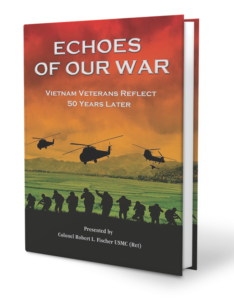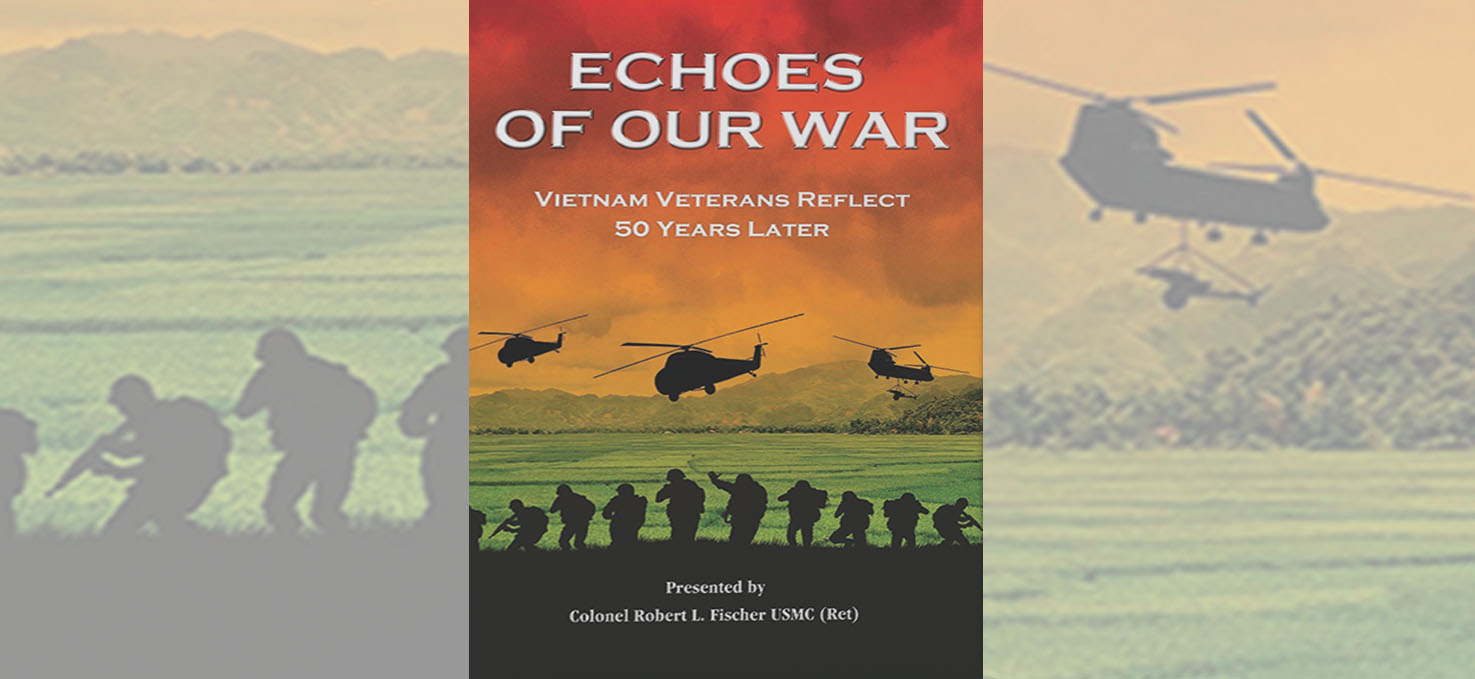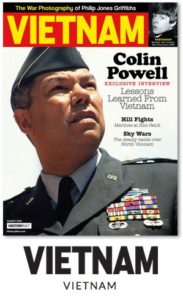
Group of friends give their answers to war’s questions
Marine vets from all recent wars who meet for lunch monthly at a steakhouse near Denver, ruminate on their wartime service and the war itself in Echoes of Our War: Vietnam Veterans Reflect 50 Years Later. Retired Marine Col. Bob Fischer, a 1955 Naval Academy graduate who served as an adviser to a South Vietnamese marine battalion in 1966-68, selected these 10 veterans—nine Marines and a Navy corpsman—to share their stories because, he writes, “it is time to examine and reevaluate precisely what happened to them and the many thousands who served honorably in a confusing war that was anything but honorable.”
Fischer had significant help in editing the book from Mark Hardcastle, an Air Force Academy graduate who served in the 1990-91 Gulf War. He also received editing assistance from two Marines whose stories are told in the book: the novelist and poet Dan Guenther, and Grady Birdsong, a writer whose nearly 60-page entry is the longest one.
Guenther developed 10 questions that the veterans answered while writing their entries. Most focused on the first one: “Describe your role, including the duration and place of your Vietnam tour, and several significant events that you think are representative of that experience.”
Former Pfc. Bill Purcell, who served with the 1st Battalion, 1st Marine Regiment, in Vietnam from September 1967 to February 1968, provides a detailed account of his 13 days of street combat in the 1968 Battle of Hue during the communists’ Tet Offensive. His tour ended abruptly when a mortar shell dropped into the middle of Purcell’s platoon and he “got thrown up in the air, slammed down into the pavement and knocked out cold.” Purcell suffered severe injuries and was medevaced out.
Guenther, who served in Vietnam for 19 months with the 1st Marine Division’s Fleet Marine Force, vividly recounts his tour as a lieutenant with the 3rd Amphibious Tractor Battalion and later with the 1st Motor Transport Battalion at the 1st Marine Division headquarters. Like all of the other entries, Guenther’s contains in-country photos, along with a list of his awards.
Birdsong was a corporal with the 1st and 3rd Marine divisions from February 1968 to November 1969. He gives an extensive response to Guenther’s question: “As you look back, what are some of the thoughts and feelings you have about the war?” His answer jibes with those of virtually every Marine in the book. He castigates Gen. William Westmoreland and other “generals at the highest levels of command” and “politicians at the highest levels of government” for seriously mismanaging the war.
“Militarily, we had the war won,” he writes. “We could have finished the job. …We simply walked away, washed our hands and left [the South Vietnamese] to their fate.”
The veterans were also asked: “Was the Vietnam War a waste?” Purcell answered: “A complete waste.” In response to another question about whether the Vietnam War was morally wrong, he concurred with the views of other Marines in the book. “I firmly believe what we were doing was right,” Purcell said. “Granted, there were events, some documented and some not, of immoral acts. But it was war.”
The “real immorality,” he added, “was our elected leaders in D.C. trying to dictate how the war should be prosecuted.” Westmoreland, he said, was a “pompous showboat and a fool.” V
This post contains affiliate links. If you buy something through our site, we might earn a commission.
For more stories from Vietnam magazine, subscribe here and visit us on Facebook:






